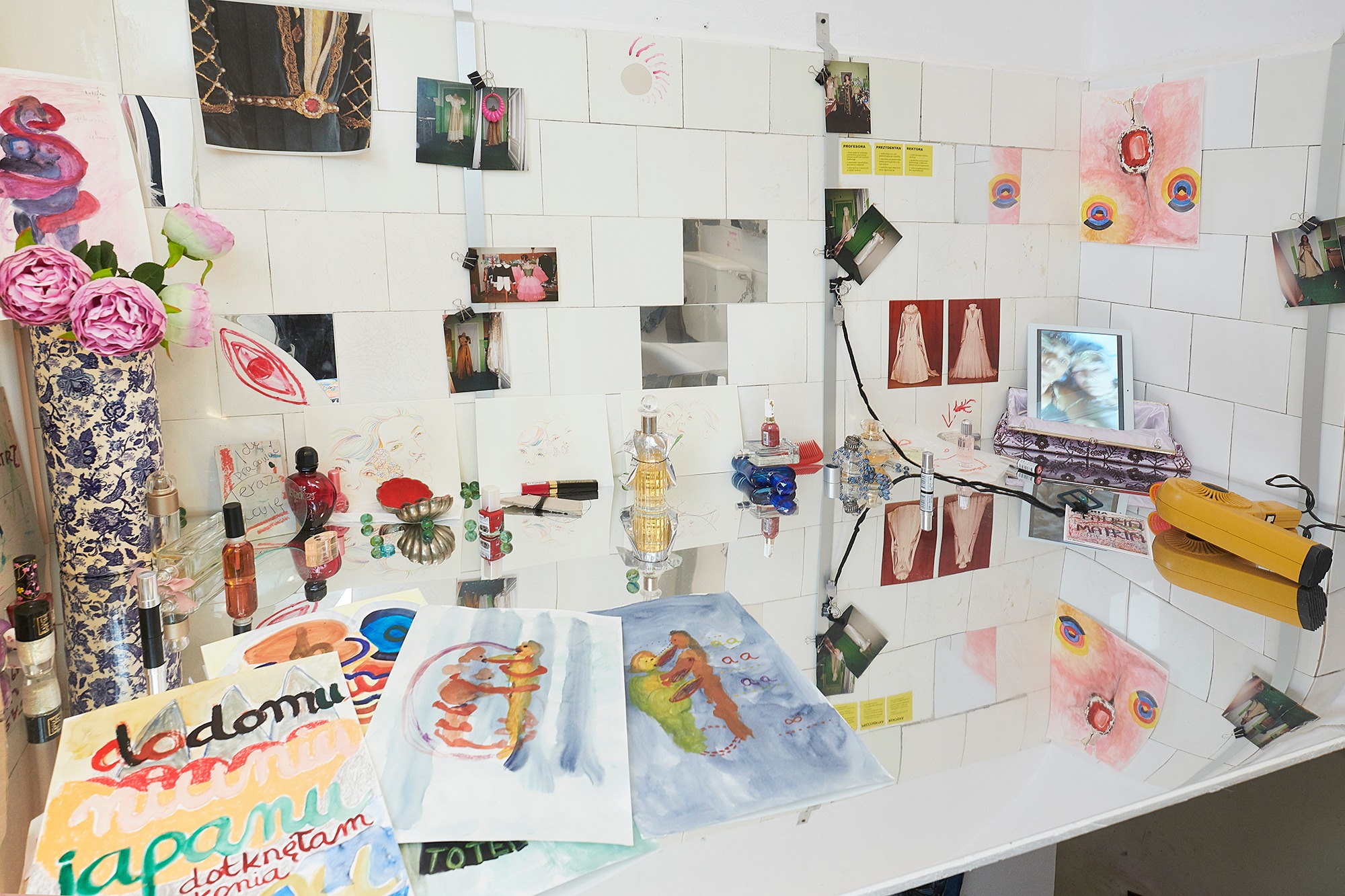CFP: XXVII Seminarium Feministyczne
Troska. Troskliwe działania i epistemologie
1 kwietnia 2023
godz. 15.00-18.00
Galeria Studio, Warszawa
Termin nadsyłania zgłoszeń: 05.03.2023
„Troska” to tytuł zaproponowany w 1969 roku przez Mierle Laderman Ukeles dla wystawy, która w historii sztuki zachowała się w formie „Manifestu dla Sztuki Utrzymania”. Wystawa „Care” miała składać się z trzech części – osobistej, ogólnej i dotyczącej utrzymania ziemi.
Ukeles rozpoczyna swój manifest od podziału rzeczywistości na pola życia i śmierci. Instynkt śmierci, pisze Ukeles, kojarzy się z separacją, indywidualnością i awangardą: „podążać swoją drogą ku śmierci, robić swoje”. Z kolei instynkt życiowy jest reprezentowany przez jedność, wieczny powrót, utrzymanie gatunku, opiekę, podtrzymujące systemy i działania, równowagę. Ukeles rozróżnia przy tym dwa główne systemy organizacyjne: Postęp i Utrzymanie (Development and Maintenance), gdzie utrzymanie obejmuje nie tylko zrównoważone relacje społeczne i środowisko naturalne (troskę o ziemię), ale także troskę o siebie.
W najbliższym Seminarium Feministycznym powracamy do tematu troski – który Ukeles wprowadziła do sztuki pół wieku temu – jako nigdy nie wyczerpanego i zawsze aktualnego. Troskę interpretujemy wielopoziomowo – odnosząc ją do wszelkiego rodzaju wspierających, powtarzalnych, często niewidocznych czynności, niezbędnych do prawidłowego funkcjonowania danego systemu – takiego jak archiwum, technologia, zasoby, rodzina, środowisko. Troska związana jest zarówno z historią codziennej pracy kobiet, jak i historią sztuki i dorobku artystycznego. Ale troska to też uczucie niepokoju, jakiego doznajemy myśląc o przyszłości.
Podczas XXVII Seminarium Feministycznego zastanawiamy się, w jaki sposób sztuka może aktywować lub reaktywować koncepcje i praktyki troski. Na ile troskliwe wysiłki, działania i epistemologie konstruują i warunkują nasz sposób bycia w świecie? Jak możemy przekierować systemy przemocowe w systemy troskliwe? Jak poprzez sztukę możemy wspólnie troszczyć się o siebie? Jakie relacje mogą wyłonić się dzięki takiemu działaniu? Jak wcielać praktyki opiekuńcze w praktykę artystyczną?
Zapraszamy do nadsyłania propozycji wystąpień, manifestów i prac twórczych, które odpowiadają na temat „Troska”. Odpowiedzi mogą dotyczyć, ale nie ograniczają się do tematów takich jak:
obiekty artystyczne jako obiekty afektu
troska jako czułe spotkanie z archiwami i spuścizną innych artystek i artystów
sztuka jako przestrzeń dla artykulacji wrażliwości i słabości
troska, czyli aktywowanie alternatywnych sposobów produkcji wiedzy: uczenia i oduczania
sztuka i ustanawianie empatycznych relacji między ludźmi oraz między ludźmi a nie-ludźmi
gesty naprawcze: troska jako metoda w artystycznych praktykach przepisywania świata
twórczość a praktyki opiekuńcze
poszukiwanie sprzymierzeńców na styku sztuki i aktywizmu w trosce o inkluzywność w sferze publicznej
horyzontalne strategie pozycjonowania w stosunku do publiczności – w kierunku wspólnego uczenia się
Format:
Prosimy o nadsyłanie krótkich abstraktów 20-minutowych wystąpień wraz z tytułem wystąpienia i notą biograficzną autorki/a oraz zdjęciem ilustrującym wystąpienie.
Kontakt:
Propozycje, zgłoszenia i pytania prosimy przesyłać na adres: seminarium.feministyczne@gmail.com
Zdjęcie:
Widok z wystawy Elki Krajewskiej&KrajM i gości “Masz tu być!”. Garderoba projektu Salmy Aldoory, w głębi rysunki autorstwa Agaty Nowickiej. Fot. Adam Gut.
CFP: 27th Feminist Seminar
Care. Caring Actions and Epistemologies
1 April 2023
3 PM – 6 PM
Galeria Studio, Warsaw
Deadline for submissions: 5 March 2023
Care is the title Mierle Laderman Ukeles proposed in 1969 for an exhibition that went down in art history in the form of her Manifesto for Maintenance Art. The show was to comprise three sections: personal, general, and Earth maintenance.
Ukeles begins her manifesto by dividing reality into the spheres of life and death. The death instinct, she writes, brings to mind separation, individuality, the avant-garde: “to follow one’s own path to death, do your own thing”. The life instinct, in turn, is represented by unification, the eternal return, the perpetuation and maintenance of the species, survival systems and operations, equilibrium. Ukeles differentiates between two basic organisational systems: Development and Maintenance, in which the latter embraces not only sustainable social relations and the natural environment (care for the Earth), but also care for oneself.
On the occasion of the next Feminist Seminar, we return to the question of care – introduced in art by Ukeles half a century ago – as something that can never be exhausted and always remains topical. We interpret care from a range of various perspectives, associating it with all kinds of sustaining, repetitive, often invisible activities that are indispensable for the proper functioning of a given system, such as an archive, technology, resources, family, environment. Care relates to both the history of women’s everyday labour and to art history and artistic oeuvre. But care also means a sense of anxiety experienced when thinking about the future.
During the 27th Feminist Seminar, we will reflect on the ways in which art can activate and reactivate the concepts and practices of care. To what extent do caring efforts, actions and epistemologies construct and condition our way of being in the world? How can we re-channel systems of violence into systems of care? How can we use art to care about each other? What relations can emerge from such activities? How to implement care-providing practices in artistic practice?
Feel cordially invited to submit proposals of papers, manifestos and creative works in response to the topic of “Care”. Submissions may concern, but do not have to be limited to such issues as:
art objects as objects of affect
care as a tender encounter with other artists’ archives and estates
art as a space for articulating sensitivity and weakness
care as activating alternative modes of knowledge production: learning and unlearning
art and establishing empathetic relations between people as well as between human and non-human entities
gestures of repair: care as a method in artistic practices of rewriting the world
creative work and care-providing practices
seeking allies at the intersection of art and activism for the sake of inclusivity in the public sphere
horizontal strategies of positioning in relation to the audience – towards learning together
Form:
Please submit short abstracts of 20-minute papers, including the title, a biographical note and an illustration image.
Contact:
Please submit your proposals and questions to: seminarium.feministyczne@gmail.com
Image:
View of the exhibition You’ve Got to Be Here! by Elka Krajewska&KrajM and guests. Dressing room designed by Salma Aldoory, with Agata Nowicka’s drawings in the background

